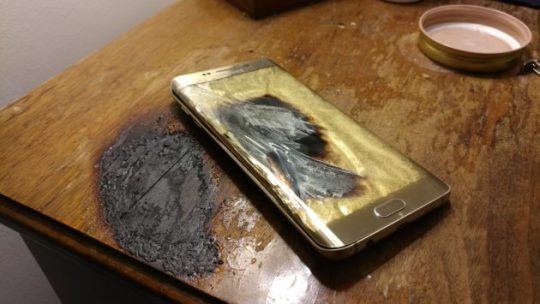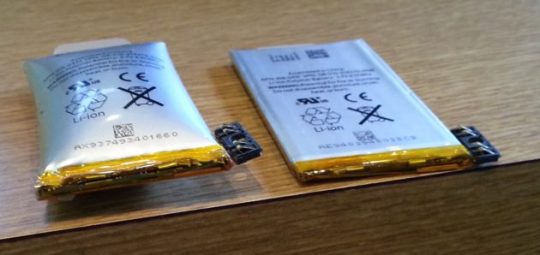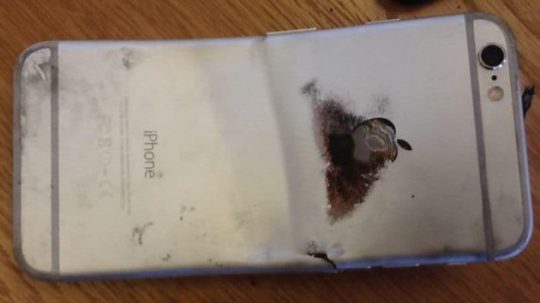
Rechargeable Lithium-ion batteries (Li-Ion batteries or LIB) power most of our electrical devices today – smartphones, tablets, smartwatches, and even electric cars. Without them, landlines would not be outdated, and new technologies would not have had a promising future. However, over recent years, these batteries have been subject to explosion controversies, especially with the Samsung Galaxy Note 7 issue. Consumers widely associate these explosions to “wrong ways of charging”, and I do know for a fact that in Cameroon, the spam chains on WhatsApp are responsible for sustaining these erroneous ideas. Some of these messages, for example, warn users of never letting phones charged up to 100%, as this has caused an explosion in this/that household (accompanied by horrifying pictures).
I despise these messages because they only aim at instilling fear and paranoia in people (and unfortunately, it works very well on our parents), and the pictures they use are certainly from other unfortunate events. Just a two hours search on Google is enough to gather the necessary scientific knowledge to help you dissipate your doubts, and feel less anxious when using your phone.
Here I have compiled the most common and absurd misconceptions related to electrocutions, charging and explosions I have seen recently, and why you should not be afraid.
How Do Explosions occur?

First thing first, let us look at the mechanism that leads to explosions in our batteries. According to HowToGeek, inside every lithium-ion battery, there are two electrodes—the positively charged cathode and the negatively charged anode—separated by a thin sheet of “microperforated” plastic that keeps the two electrodes from touching. When you charge a lithium-ion battery, lithium ions are pushed by electricity from the cathode, through the micro-perforations in the separator and an electrically conductive fluid, and to the anode. When the battery discharges, the reverse happens with the lithium ions flowing from the anode toward the cathode. This is the reaction that powers our devices.

Now explosions come down to a problem of short-circuiting. In this case, the plastic separator fails and lets the anode and cathode touch, and once these two touches, the battery starts to overheat. Short-circuiting can be caused by frequent drops that lead to failure of the separator. But also due to
the insufficiency of space in the battery (poorly designed batteries as was the case in the Galaxy Note 7). Batteries inflate and deflate when charged, and not enough space for the electrodes and separator in the battery leads to short circuitry. Equally extreme heats initiate chemical reactions (emission of gases occur) that inflate the battery leading to an explosion.
Misconceptions Related to Charging and Electrocutions:
1. Using headphones on a plugged phone will cause an electrocution
So, this is the latest absurd myth I have heard and what pushed me to write this post. Having your headphones on while your phone is charging will not electrocute you. Well…not certainly. The only way you could get electrocuted depends on whether or not the inner wire or pieces of metals inside the headphones are exposed. Today, our headphones are so well insulated with plastic layers that there is no chance for electric current to leak through it, EXCEPT, if you invest in really cheap headphones that wear off easily. Even if you do get electrocuted, the shock will be so minimal that you won’t feel anything, and even if you do, there will be nothing to panic about. The current passing through our headphones is so small that it cannot even kill a rabbit.
Note: This is the same principle when pressing your phone against your face when taking a call while the phone is charging.
2. Using a plugged phone will lead to overheating, hence the explosion
Your phone will hardly explode if you use it while charging. Indeed your phone will heat up. The “smart” before phone in the word “smartphone” isn’t just for decoration. Our phones nowadays contain inner circuitry that regulates the current and voltage intake of our phones so as to protect the battery. This process is controlled by the CPU which does work (the reason why the phone heats up while charging). Using your phone while it is charging, especially when playing heavy games like Asphalt will force the CPU to do more work hence produce more heat. Bear in mind that Li-Ion batteries hate the heat, and easily depreciate when exposed to certain degrees. However, the heat evolved by our CPUs isn’t enough to cause an explosion (for this to happen “extreme heat” will be needed).

3. Charging overnight will cause an explosion
Now, this is not always true. As written above, our phones are smart enough to know when a full charge has been reached and will cut contact. However, this highly depends on the type of charger used. Some chargers will lead to a failure of the inner circuitry leading to overcharging. This eventually leads to an overheating (extreme heat), damaging the inner structure of the battery and you
guess what happens next. That is why it is important to ALWAYS aim to use the original charger, or buy from well-known brands like Samsung. Also, check the power ratings of the charger you use. Aim at using good quality chargers that have the same ratings as your original charger, and avoid those with way higher current intake than the one on your original charger, as high current leads to heat. So the danger here is not charging your phone overnight, but the type of charger you use.
4. The presence of a phone in a kitchen with the gas open will lead to an explosion
To be honest, when I first read this I burst into laughter because of the probability of this to happen (which is very close to 0). If you have an old cooker with defections that frequently leak gas, the only thing that can lead to an explosion is a spark or fire. In case of a spark, the static electricity produced will ignite a fire that will travel back to the gas cylinder and BOOM! You find yourself scour. On a more serious tone phone do not produce sparks, UNLESS there is a short circuit in
your battery and it is about to explode (very unlucky scenario). However today, the inner components of our phones are insulated to water and even dust. Hence the probability of a spark inside your phone to produce static electricity in the air is very unlikely. Honestly, you should be more careful with other probable sources of sparks such as turning on/off lights or plugging/unplugging devices.
Besides, this is why gas stations do not explode despite the number of switched-on phones around.
Precautions:
If you are still skeptical and care much for your investment and life, here are some proposed precautions:
- Our batteries have a finite charging cycle, and each time your battery reaches 0% reduces a cycle. It is advised to keep your battery between 30% and 80% for the most paranoiac of us (you will have however replaced your phone/battery since then).
- Always use the original phone charger or a good quality one from reputable brands (it
maybe expensive but it’s worth it if you don’t want to wake up to a fire at night). - Invest in good quality earphones if the slightest electrocution upset you (or you can invest in wireless earbuds!).
- Avoid loading heavy apps while your phone is charging to keep the life of your battery extended
- While a permanently inflated battery does not represent an immediate danger, it is always a good idea to replace the battery as soon as it inflates.
- Avoid dropping your phone as much as possible, or use rubber cases as they better absorb shocks
- Avoid switching any device if you smell gas in the house
- And it is obvious not to place your phone near heat sources.
The post finally comes to an end. I know it is pretty long but I think it was worth writing about. Smartphones and any other electrical devices functioning on rechargeable LIB are meant to be used, and no one has the right to prevent you from enjoying their use! Please feel free to comment if you have any other questions!



![[Tutorial]Here Is How I Link My Phone and PC](https://blogger.googleusercontent.com/img/b/R29vZ2xl/AVvXsEg5rJkBYJJMClrUv9bUbfz4vcSLN6VBNunlZf42iTtBoAoRK4IE05SG3kPYWu2dTFpzCW1sElKDQwRHOa7P7fWAUBh9M0IrQSITv2GpVj_7TxXyD4YD-kyLMR9gScbSIrCCQVhUgqgKloE/s72-c/ezgif.com-webp-to-jpg+%25284%2529.jpg)


No comments:
Post a Comment